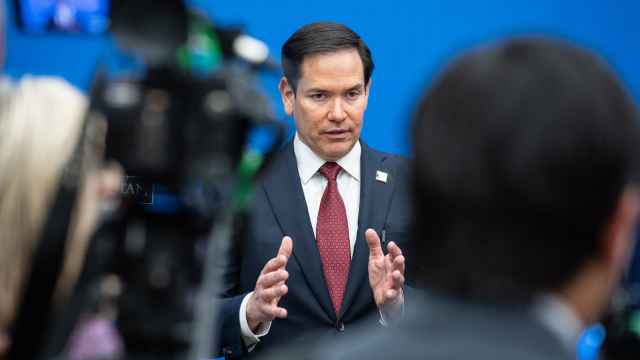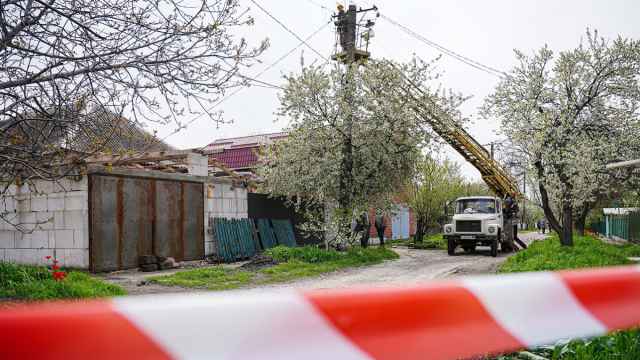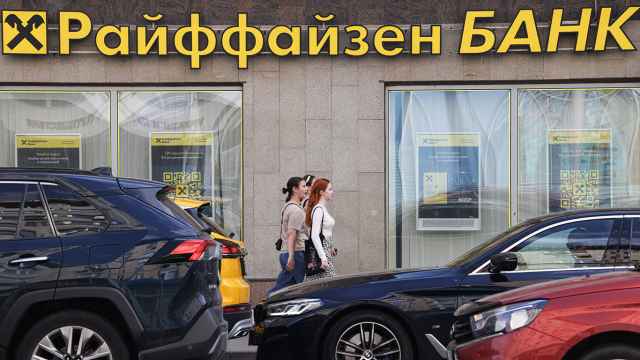President Vladimir Putin on Monday signed into law a bill that increases criminal liability for fictitious residential registration, part of a crackdown on illegal immigration, one of the country's most sensitive political issues.
The law is one of two contentious pieces of legislation that have been pushed through the State Duma in its final two sessions and that have been largely overshadowed by ongoing anti-government protests in Kiev and the release of high-profile prisoners in Russia. The other piece of legislation is a bill ostensibly aimed at fighting extremist Internet content but that could also be used to stifle opposition activity.
The bill approved by Putin on Monday is part of a fight on so-called "rubber apartments," a term that refers either to apartments in which up to thousands of people are registered but do not live, or to dilapidated buildings that house large numbers of migrant workers in often unhygienic and overcrowded environments.
Human right activists and critics of the new law have called it an inadequate response to Russia's immigration issues.
"We do not need any new laws about this," said Dmitry Gudkov, an outspoken anti-Kremlin Duma deputy, by telephone. "It is, of course, highly problematic that 23 people are registered at the same apartment, but the issue, in its essence, is economic."
"Many Russian businesses look for cheap labor because they are uncompetitive and cannot pay acceptable salaries. That is the problem we need to solve," Gudkov said.
Migrant workers — like nearly all people on Russian territory — are required to register with local authorities in their city of residence.
In 2011, authorities identified 6,400 of these "rubber apartments," at which more than 300,000 people were registered, according to Interfax. These figures place an average of 46 people at a same address.
Earlier this month, the Federal Migration Service announced that it would verify migrants' addresses in response to official complaints, but would not respond to any anonymous tips about "rubber apartments."
Fictitious registration under the new law will be punishable by up to a fine of 100,000 to 500,000 rubles and up to three years of hard labor or imprisonment.
Last week, the Duma also passed legislation that authorizes state prosecutors to block websites without a court order if they are deemed "extremist" or call for unsanctioned protests, thereby limiting opposition groups' ability to disseminate information.
The new law would significantly extend current legislation regulating online content. Judges are currently authorized to have websites blocked if they contain pirated content, child pornography or information about drugs or suicide.
The new legislation, which is set to come into force on Feb. 1, could create a special agency within the Prosecutor General's Office that would be mandated to surf the web in search of extremist content.
"I voted against this law, as many other deputies did," Gudkov said. "It is unconstitutional. Only a court should be allowed to decide what is extremist and what is not."
"The people who give idiotic advice in the Kremlin came up with this idea," Gudkov said. "But they do not understand that much about information technology or our fight for freedom of expression."
The Kremlin human rights council also expressed its concerns over the bill, saying it was "fraught with serious infringements to the Constitutional rights and freedoms of man and citizen."
The new legislation has also raised concerns about the possibility of extremist content being deliberately added to websites just to have them shut down.
The author of the bill, Duma Deputy Andrei Lugovoi of the Liberal Democratic Party, insisted that the bill would not lead to abuse.
Contact the author at g.tetraultfarber@imedia.ru
A Message from The Moscow Times:
Dear readers,
We are facing unprecedented challenges. Russia's Prosecutor General's Office has designated The Moscow Times as an "undesirable" organization, criminalizing our work and putting our staff at risk of prosecution. This follows our earlier unjust labeling as a "foreign agent."
These actions are direct attempts to silence independent journalism in Russia. The authorities claim our work "discredits the decisions of the Russian leadership." We see things differently: we strive to provide accurate, unbiased reporting on Russia.
We, the journalists of The Moscow Times, refuse to be silenced. But to continue our work, we need your help.
Your support, no matter how small, makes a world of difference. If you can, please support us monthly starting from just $2. It's quick to set up, and every contribution makes a significant impact.
By supporting The Moscow Times, you're defending open, independent journalism in the face of repression. Thank you for standing with us.
Remind me later.





